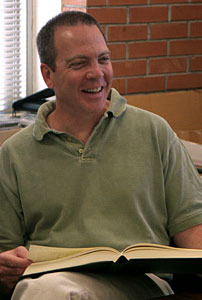Curtis Marean, a paleoanthropologist and expert on human origins, will speak at Gustavus Adolphus College at 7 p.m. Tuesday, March 10 in Wallenberg Auditorium, located in the College’s Alfred Nobel Memorial Hall of Science. This free, public lecture is part of Marean’s residency through the Rydell Professorship at Gustavus funded by the Drs. Robert E. and Susan T. Rydell.
Marean is currently a professor at the Institute of Human Origins as part of the School of Human Evolution and Social Change at Arizona State University in Tempe, where he teaches courses on the Stone Age of Africa, prehistoric and historic hunger-gatherers, zooarchaeology, and paleoecology. During the last decade he has put more effort into on-site archaeological excavations. In 2007, Marean and colleagues announced that they had found the oldest known evidence for the use of coastal resources, dating back to about 164,000 years ago, in Cave 13B at Pinnacle Point on the South African coastline near Mossel Bay within the Cape Floral Kingdom.
Marean’s lecture at Gustavus on March 10 is titled “The Cape Floral Kingdom, Shellfish, and Modern Human Origins: Trans-disciplinary Problems Require Trans-disciplinary Projects.” Marean will explore how his research off the coast of South Africa shows the earliest evidence for behaviorally modern people. As part of his residency at Gustavus, Marean is also co-teaching a cultural anthropology course with Gustavus Professor of Anthropology and Interdisciplinary Studies Karen Larson.
While in Minnesota, Marean will also speak at the Science Museum of Minnesota in St. Paul at 7 p.m. Wednesday, March 11. In this lecture, Marean will broach the questions “Where in Africa did modern humans evolve?” and “When did they become behaviorally modern and why then and at that place?” This lecture is also free and open to the public, but with limited seating. For reservations call the Science Museum of Minnesota at 651-221-9444.
The Rydell Professorship at Gustavus is a scholar-in-residence program designed to bring Nobel laureates, Nobel Conference lecturers, and similarly distinguished scholars to the campus as catalysts for enhancing learning and teaching. It was established in 1995 by Drs. Robert E. and Susan T. Rydell of Minnetonka, Minn., to give students the opportunity to learn from and interact with leading scholars.
For more information about the Rydell Professorship at Gustavus or the lectures associated with it, contact Associate Professor of Mathematics and Computer Science Tom LoFaro at tlofaro@gustavus.edu or 507-933-7463.

Leave a Reply
You must be logged in to post a comment.